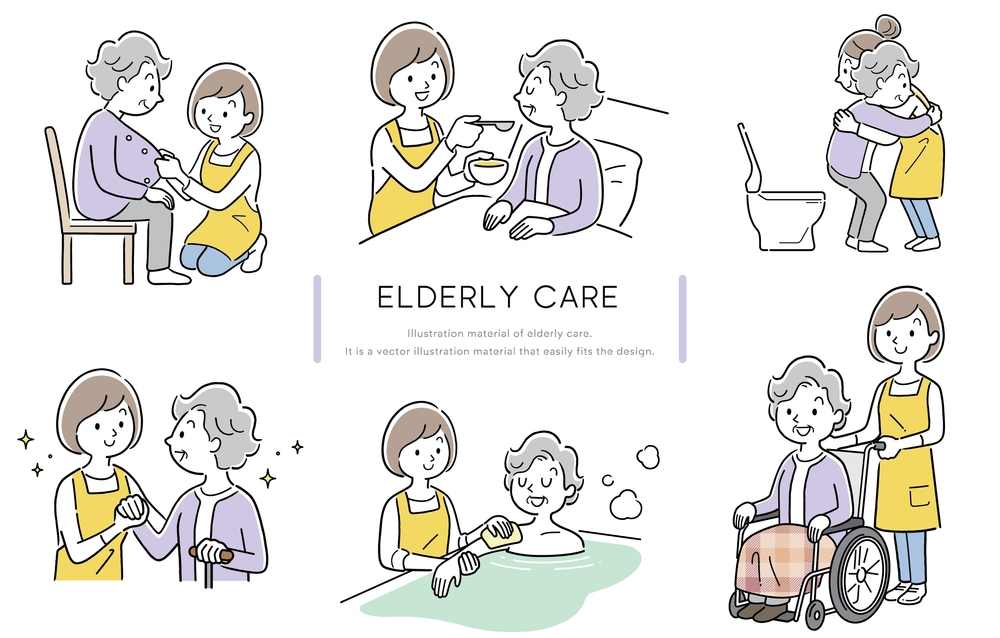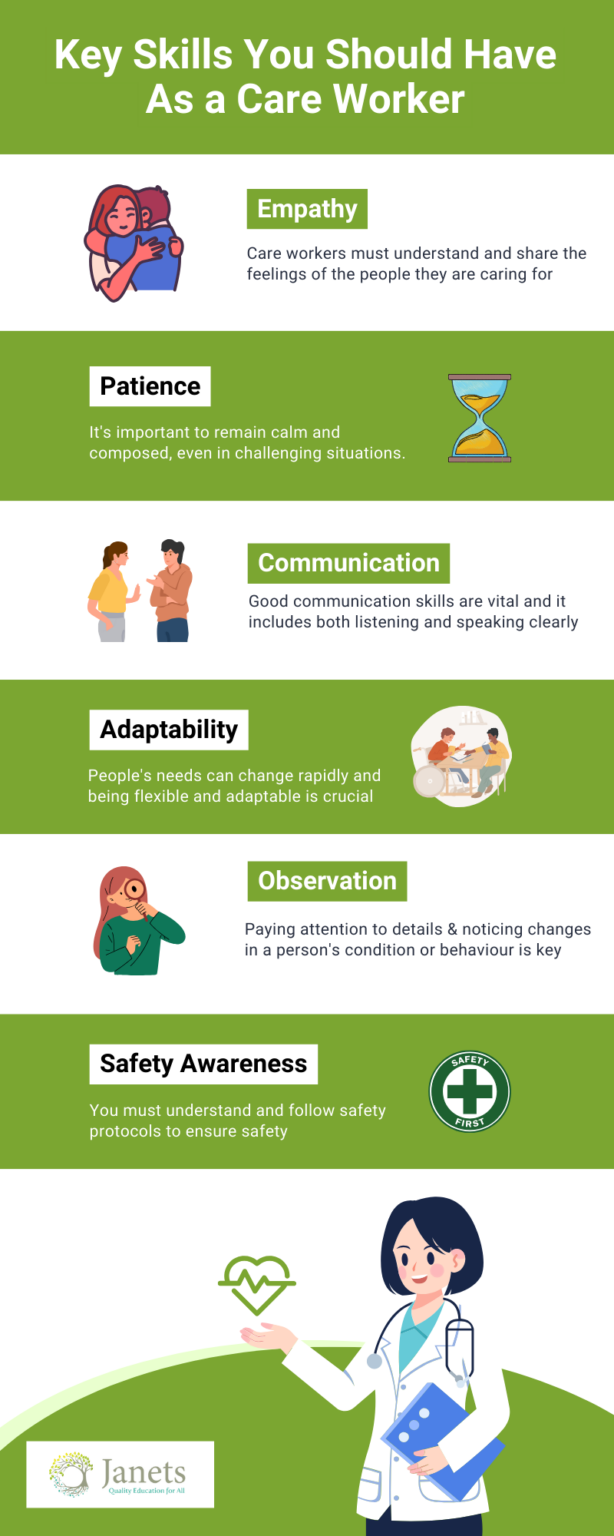A care worker, also known as a helper or caregiver, is essential in caring for persons who need help for a variety of reasons. Think of them as friendly and compassionate helpers who support people in their daily lives. These dedicated individuals offer their helping hand to those who may find it challenging to do things by themselves.
Care workers assist with a variety of daily duties such as eating, dressing, and bathing. They ensure that individuals who need extra support can maintain their personal hygiene and stay comfortable. Moreover, they are experts at providing companionship, which means they are not just there to help with physical tasks but also to be a friendly and kind presence in someone’s life. They listen, chat, and make sure the people they care for feel happy and valued.
Whether it’s an elderly person who needs help due to age-related difficulties, a child with special needs, or someone recovering from an illness or injury, Care workers are there to lend a hand and a warm smile. They are like everyday heroes, making a big difference in the lives of those they assist, and ensuring that people can live their lives as comfortably and happily as possible. So, whenever you see a Care worker, remember they are here to make the world a better and more caring place.
What are the Main Duties and Responsibilities of a Care Worker?

A care worker plays a crucial role in helping people who need assistance with daily activities and support due to illness, disability, or old age. Here are their main duties and responsibilities:
Assisting with Daily Tasks: Care workers help individuals with tasks like bathing, dressing, and eating, ensuring they can maintain their personal hygiene and nutrition.
Providing Companionship: They offer companionship to alleviate loneliness, engage in conversations, and provide emotional support.
Medication Reminders: They remind individuals to take their prescribed medications on time and may assist in administering them.
Monitoring Health: They monitor the person’s health, noting any changes and reporting them to medical professionals when necessary.
Mobility Assistance: Care Workers assist with mobility, helping individuals move around safely and preventing accidents.
Household Chores: They may perform light housekeeping duties like cleaning, cooking, and grocery shopping to maintain a comfortable living environment.
Documenting Care: Keeping detailed records of care provided, including any changes in health or behaviour.
Respecting Privacy: Always respecting the individual’s privacy and dignity while delivering care.
Emergency Response: Being prepared to respond to emergencies promptly and effectively.
Working with Families: Communicating with the families of those being cared for to update them on the person’s condition and needs.
Continuing Education: Staying updated with best practices in caregiving through training and education.
In summary, a care worker’s role is to ensure the well-being, safety, and comfort of those they care for, offering both physical assistance and emotional support to enhance their quality of life.
What Qualifications Do You Need To Become A Care Worker in the United Kingdom?
To become a care worker in the UK, you do not need formal qualifications or any particular GCSEs, A-Levels or degrees. However, many employers will expect you to have a basic level of education at the very least.
Moreover, for certain or specific areas of social care, you will need to demonstrate strong necessary knowledge, skills and attributes. This means that you may need to get additional training and qualifications to land yourself a job or have a competitive advantage.
Here are some options you can look at:
Care Certificate
The care certificate sets a standardised framework for the fundamental skills and knowledge that care workers need to provide safe, compassionate, and high-quality care. It covers essential topics such as communication, privacy and dignity, safeguarding, infection control, and more.
This certificate is valuable for both individuals seeking care worker positions and employers because it ensures that care workers are adequately trained and understand the core principles of care. Here at Janets, we have a course on Care Certificate which will ensure you gain the knowledge and skills required by the end of the course.
NVQ (National Vocational Qualification) in Health and Social Care
An NVQ in Health and Social Care provides comprehensive, job-specific training and education in the field of health and social care. These qualifications cover a wide range of topics, from patient care and communication to health and safety, and are designed to ensure that individuals have the necessary knowledge and skills to excel in their care roles.
Attaining an NVQ demonstrates a candidate’s competence and commitment to the sector, making them highly desirable to potential employers. It equips individuals with skills and theoretical understanding, allowing them to deliver high-quality care and support while complying with regulatory requirements and professional standards.
What Experience Do You Need for Care Worker Jobs?

Here are the types of experience that are valuable for a care worker’s job
Previous Caregiving Experience: Previous work in caregiving, whether for family members or in a professional setting, demonstrates your understanding of the role and the needs of individuals.
Volunteer Work: Volunteering at nursing homes, hospitals, or community organisations can provide a relevant experience.
Internships: Completing internships in healthcare or caregiving settings can help you gain practical experience.
Personal Care of Family Members: Taking care of ill or elderly family members demonstrates your ability to provide care.
Childcare Experience: Experience in childcare can be beneficial when working with children or individuals with developmental disabilities.
Certification Programs: Completing certified caregiver training programs can show potential employers your commitment and knowledge in the field.
References: Providing references from individuals or organisations you’ve assisted can strengthen your application.
Continuing Education: Pursuing additional courses or workshops related to caregiving can enhance your qualifications.
Medication Management: Familiarity with medication management and administration can be a significant asset.
Language Skills: If you’re working with diverse populations, fluency in different languages can be a valuable asset.
Specialised Experience: Some positions may require specific experience, such as dementia care or pediatric caregiving.
CPR and First Aid Certification: Obtaining certifications in CPR and first aid can be essential for certain care worker roles.
In summary, experience as a care worker can be gained through prior caregiving roles, volunteer work, internships, and formal training programs. Hence, highlighting relevant experiences and certifications on your CV can help you stand out as a candidate for care worker positions.
Key Skills You Should Have as a Care Worker

As a care worker, several key skills are crucial for providing effective support and assistance to those in need:
-
Empathy: Care workers must be able to understand and share the feelings of the people they are caring for. This means being sensitive to their emotions and showing that you care.
-
Patience: Patience is essential when working with individuals who may have various challenges. It’s important to remain calm and composed, even in challenging situations.
-
Communication: Good communication skills are vital for a care worker. This includes both listening and speaking clearly, so that clients can express their needs, and you can understand and respond appropriately.
-
Compassion: Compassion goes hand in hand with empathy. It means genuinely caring about the well-being of those you’re caring for and taking action to improve their quality of life.
-
Adaptability: People’s needs and situations can change rapidly. Being flexible and adaptable to these changes is crucial in providing the best care possible.
-
Observation: Paying attention to details and noticing changes in a person’s condition or behaviour is essential for early intervention and ensuring their well-being.
-
Teamwork: In many care settings, you’ll work as part of a team. Collaborating effectively with colleagues and other professionals is key to providing comprehensive care.
-
Time Management: Care workers often have many tasks to juggle. Good time management skills ensure that all responsibilities are met efficiently.
-
Respect for Diversity: People you care for come from diverse backgrounds and have various needs. Being respectful of these differences and providing culturally sensitive care is important.
-
Problem-Solving: Care workers encounter challenges regularly. Thinking critically and finding solutions to problems is a valuable skill.
-
Self-Care: Caring for others can be both physically and emotionally taxing. Taking care of yourself, both mentally and physically, is vital to avoid burnout.
-
Safety Awareness: Ensuring the safety of those you care for is paramount. Understanding and following safety protocols and procedures is essential.
In summary, a care worker should possess empathy, patience, and effective communication skills, along with qualities like compassion, adaptability, and strong observation skills. However, working well within a team, managing time efficiently, respecting diversity, and being a problem solver is also crucial. Additionally, self-care and safety awareness are vital to excel in this role.
Career Opportunities as a Care Worker
After being a care worker, there are various career opportunities that you can explore to advance your career and build on your skills. The care sector offers a range of positions catering to different interests and skill sets. Some of the common career opportunities in the care sector include:
Nursing Assistant: Nursing assistants provide essential support to registered nurses and patients in various healthcare settings. They assist with daily care tasks, monitor vital signs, and offer emotional support to patients, making them a crucial part of the healthcare team. The salary will range between £18,000 to £24,000 per year.
Home Health Aide: Home health aides provide personalized care to individuals in their homes. They assist with daily living activities, medication management, and help clients maintain their independence and quality of life. The salary will range between £17,000 to £22,000 per year.
Medical Secretary: Medical secretaries play a vital role in healthcare administration by managing patient records, scheduling appointments, and ensuring smooth communication within medical facilities. Their organizational skills are crucial for efficient healthcare delivery. The salary will range between £18,000 to £28,000 per year.
Social Worker: Social workers help individuals and families navigate complex social and emotional challenges. They provide counseling, support, and resources to address issues such as mental health, substance abuse, and family dynamics. The salary will range between £25,000 to £30,000 per year.
Healthcare Administration: Healthcare administrators manage the operational aspects of healthcare facilities. They oversee budgets, staff, and compliance with regulations, ensuring the smooth functioning of healthcare organizations. The salary will range between £18,000 to £24,000 per year.
Personal Care Trainer: Personal care trainers work with clients to improve their physical and mental well-being. They create fitness plans, offer nutritional guidance, and support clients in achieving their health goals. The salary will range between £18,000 and £40,000 per year.
Mental Health Worker: Mental health workers support individuals with mental health issues by providing counseling, therapy, and facilitating access to resources. They play a crucial role in improving the mental well-being of their clients. The salary will range between £18,000 to £25,000 per year.
How Much Do Care Workers Earn?

Care workers, often referred to as caregivers, play a vital role in helping people who need assistance due to age, illness, or disability. Their salaries vary depending upon location, experience, employer and so much more. Here, take a look:
Location Matter: Care worker salaries can differ significantly depending on where they work. In some areas, they may earn more due to a higher cost of living.
Experience Counts: Care workers with more experience generally earn more. They gain expertise over time, making them more valuable to clients and employers.
Type of Care: The type of care also affects earnings. Those providing specialised medical care, such as nursing care, may earn more than those offering basic assistance.
Employer: Care workers can be employed by individuals, agencies, or healthcare facilities. Wages may differ based on the employer and the demand for their services.
Certification: Becoming a certified care worker through training and education can lead to higher pay, as it demonstrates competence in caregiving.
Shifts: Working night shifts, weekends, or holidays may come with additional pay, known as shift differentials.
Benefits: Some caregivers receive benefits such as health insurance and retirement plans, which can boost their overall pay.
Union Membership: In some cases, being part of a union can provide care workers with collective bargaining power to negotiate better pay and benefits.
Overall, care worker earnings can range from minimum wage to well above average, depending on these various factors and their dedication to providing compassionate care to those in need.
Training Courses to Become a Care Worker
If you aspire to become a care worker in the UK, there are several training courses available to help you gain the necessary skills and knowledge. Furthermore, these courses cover a wide range of health and social care issues, ensuring that you are well-prepared for your career as a care professional. Here’s a breakdown of some key courses:
Health & Social Care UK Standards: 5 in 1 Bundle: This comprehensive bundle covers the fundamental standards and guidelines for care workers in the UK, focusing on essential skills and practices for providing quality care to individuals in need.
Health and Social Care Management: This course delves into the principles of managing health and social care services, teaching you how to effectively lead and coordinate care teams while maintaining high standards of care.
The Care Certificate Preparation: The Care Certificate is a crucial requirement for care workers. This course prepares you for the certification exam, ensuring you meet the necessary competency standards for your role.
Adult Nursing Training: This training equips you with the knowledge and practical abilities required to help and care for adults with various healthcare needs, emphasising empathy, communication, and clinical competence.
First Aid at Work and Appointed Persons: Learn essential first aid skills, which are vital in any care setting. You’ll be prepared to respond to emergencies and provide immediate assistance to individuals in distress.
Public Health: Understand the broader context of health and social care by studying public health principles. This course highlights the importance of preventive healthcare measures and their role in improving overall well-being.
Diploma in Health And Social Care at QLS Level 5: This diploma program offers in-depth knowledge and expertise in health and social care at an advanced level, enhancing your career prospects as a care worker.
Hence, by completing these courses, you will be well-equipped to embark on a fulfilling career as a care worker, providing essential support and assistance to those in need while adhering to the highest standards of care and professionalism.
How to Become a Care Worker in the UK?

Becoming a care worker in the UK involves several clear and achievable steps:
1. Complete Basic Education
Start by finishing your basic education, which typically includes GCSEs or their equivalent. This foundation provides essential literacy and numeracy skills.
2. Gain Knowledge
Learn about the role of a care worker and the importance of providing assistance and support to individuals who need help with daily tasks due to illness, disability, or age.
3. Consider Training Programs
Look into care worker training programs offered by colleges or vocational institutions. These courses teach vital skills like communication, empathy, and basic medical knowledge.
4. Find Job Vacancies
Search for care worker job vacancies in your local area. You can use online job boards, visit care facilities, or inquire about local government employment services.
5. Apply for Jobs
Prepare a simple and clear resume that highlights your education and any relevant training or volunteer experience. Apply for jobs that match your skills and interests.
6. Interviews and Checks
Attend job interviews and be prepared to discuss your interest in care work and your willingness to learn. Most employers will require background checks, including a Disclosure and Barring Service (DBS) check.
7. Certifications
Depending on the type of care work you pursue, you may need specific certifications, such as First Aid training or medication administration training. Obtain these as required.
8. Start Working
Once hired, begin your career as a care worker. Be punctual, compassionate, and willing to learn from more experienced colleagues.
9. Continuous Learning
Embrace opportunities for continuous learning and improvement. Attend workshops, and seminars, or pursue further qualifications to enhance your skills and career prospects.
10. Build Experience
As you gain experience, you can consider specialising in areas like elderly care, disability support, or mental health care, depending on your interests and the needs of your clients.
11. Career Advancement
With dedication and experience, you can explore career advancement options, such as becoming a senior care worker, or supervisor, or even pursuing higher education to become a nurse or social worker.
12. Stay Updated
Stay informed about changes in care regulations, best practices, and new developments in the field to provide the best care possible.
Remember, a caring attitude, good communication skills, and a commitment to helping others are essential attributes for a successful career as a care worker in the UK.
The Rewards and Challenges of Being a Care Worker

Being a care worker can be extremely fulfilling, but it also has its share of difficulties. Let’s explore the rewards and challenges in detail:
Rewards
1. Care workers provide essential support to individuals who need it, making a positive impact.
2. Seeing the smiles and gratitude from those they care for can be immensely fulfilling.
3. Each day brings new experiences and challenges, preventing monotony on the job.
4. It can be heartwarming to form significant ties with clients and their families.
5. Many care roles offer flexible hours, allowing workers to balance work and personal life.
Challenges
1. Witnessing suffering or loss can be emotionally taxing and require coping mechanisms.
2. Care workers often perform physically demanding tasks, which can lead to fatigue.
3. Unfortunately, some care roles are not well-compensated for the demanding work they do.
4. The nature of care work means dealing with unexpected situations, making planning difficult.
5. Despite their critical role, care workers may not always receive the recognition they deserve.
Conclusion
In conclusion, being a care worker is a noble profession with many rewards, but it also involves coping with emotional strain, physical demands, and financial challenges. However, transitioning into this career requires careful consideration of both the rewards and challenges it presents.
Frequently Asked Questions (FAQ)
What is a care worker?
A care worker, or carer, helps people with daily tasks due to illness, disability, or age.
Where do care workers work?
Care workers can work in homes, care facilities, or hospitals.
Do I need any qualifications to become a care worker?
In the UK, formal qualifications are only sometimes required to become a care worker.
Can you be a carer with no qualifications?
Yes, you can be a carer without formal qualifications, but some roles may need them.
What are the characteristics of a successful care worker?
Successful care workers are kind, good communicators, adaptable, and reliable.
How can I gain experience if I've never worked in care before?
Gain care experience through volunteering or entry-level positions.
What are the typical working hours for a care worker?
Working hours for care workers vary but often include shifts, weekends, and holidays.
How can I find care worker job vacancies?
Find care worker job vacancies online or through local agencies.
Can I work as a care worker if I'm not a UK citizen?
Non-UK citizens can work as care workers if they have the right visa or work permit.





 LOGIN/Sign up
LOGIN/Sign up




